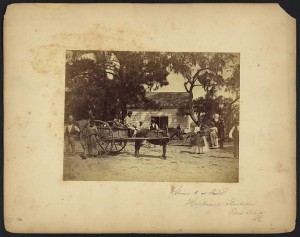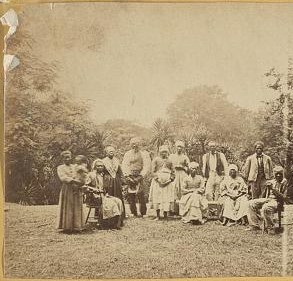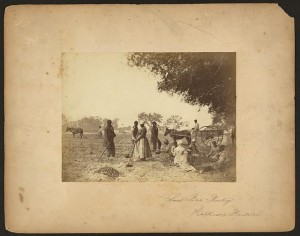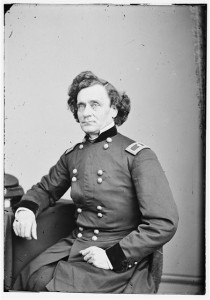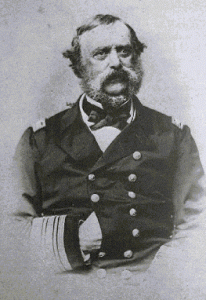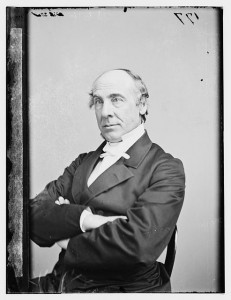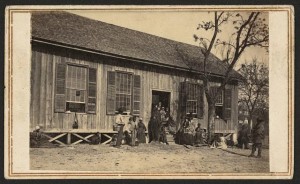Overseers and Durable Clothing
Union military success along the South Carolina coast created a logistics problem for General Thomas W. Sherman and Commodore Samuel F. Du Pont – as plantation owners have fled, thousands of slaves are looking for help from the Union army. The February 23, 1862 issue of The New-York Times published a couple articles on the situation. In the first the VAGABOND correspondent described the situation as he saw it:
GEN. SHERMAN’S DEPARTMENT.; The Condition of the Blacks–Their Capabilities and Inclinations–Gen. Sherman’s Course, &c.
PORT ROYAL, Tuesday, Feb. 11, 1862.
Previous to forming an opinion of the plan recently promulgated by Gen. SHERMAN for the amelioration of the condition of the blacks in his command, it is necessary to contemplate some of the facts which are patent here to every one. The order, which has reached the North before this time, itself states the considerations which induced Gen. SHERMAN to take the step that probably has already been the subject of various and, perhaps, violent criticisms. The most conservative of conservatists, if he were here, would admit that it is impossible to allow the negroes deserted by their masters to remain any longer in an entirely unprotected condition. The thousands who, in various quarters, have either stayed behind when their owners fled, or come themselves within our various lines, it is manifest, to every looker-on, are unfit to care for themselves. They are in a state of imbecility and ignorance almost inconceivable, and yet show signs of apprehension that occasionally startle one, from the contrast with their ordinary stupidity. The most intelligent have repeatedly declared within my hearing that the blacks generally are unfit for self-government; that they need overseers; most of them are well enough inclined; express a willingness to work; manifest no fanciful hopes of living in utter idleness, and though the mass will doubtless need incentives, both of reward and punishment, I firmly believe that with the moderate use of both those incentives they can be induced to labor. Instances, doubtless, have occurred of stubborn negroes refusing to work; of these, who imagine themselves utterly free, and expect and intend never to work again. I have heard of one glaring instance of insubordination, where a black driver turned on a white overseer and attempted to throttle him. The instance is well authenticated, but it is solitary. However, I record it, lest, by omission, I should give an unfair coloring to events. For I have no theory to maintain, no party to support; my business and aim are simply to see, so far as may be, with unembarrassed vision, and to draw, if possible, from what I see, the deduction of an unbiased judgment.
But to the negroes. Their rapidly increasing numbers makes an immense and urgent demand on those in authority. At Edisto a colony of 1,200 has been established, and there, I have repeatedly been informed, they have asked for arms to use against their former masters. At Otter Island is a colony of several hundred; in the immediate vicinity of Beaufort there must be at least five or six hundred; all over the cotton islands, on the plantations, not only have the hands remained, but crowds of fugitives still come in daily. These should not always be called fugitives, as it is not unfrequently the masters who have fled first; but at any rate here is this constantly increasing population, consuming the food left on the plantations, and certain soon to become an oppressive burden unless steps be taken to obviate such a result. General orders have indeed been issued to allow the subsistence stores found in the country to remain on the plantations for the use of the blacks, and thus the anomaly in warfare is presented of an army scrupulously respecting the stores found in a conquered territory, although those to whom the stores originally belonged were its open enemies. The blacks, however, have claims upon our sense of justice as well as on our humanity, and our considerations of selfish policy. Not only ought we to feed them as we would any other inoffensive creatures in a starving condition; not only should we supply their most immediate wants, so as not to make enemies of a most important part of the population, but there is another consideration; they have repeatedly proven themselves our friends; they have given highly important information; they continually act as guides, as scouts, as soles; they come in daily with news from Savannah and Charleston, so that the commanders of the army and navy are kept fully apprised of all important secrets in those places; they bring in newspapers from each city; it was they who disclosed the secret of Wall’s Cut, and that of Wilmington Narrows; they have told the condition of the defensive works in Savannah River; they communicated information of a concealed force in the woods near Port Royal Ferry, in January, and so saved Gen. STEVENS from an unexpected attack by the rebels; they go on all reconnoissances, not only willingly, but at their own request and earnest desire. Such people have a right that their services should in some way be recognized. They render efficient assistance to the National arms in this command, and every principle of right, every rule of policy demands that such assistance be rewarded. …
On February 23rd a meeting was held at New York City’s Cooper Institute to organize aid for the slaves:
AID FOR CONTRABANDS AT PORT ROYAL.; Interesting Meeting at Cooper Institute Addresses by Rev. Messrs. French and Lindsay Rev. Dr. Bellows and Dr. Tyng Appointment of a Committee to Collect and Distribute Aid for the Unfortunates.
A very large meeting convened at Cooper Institute on Thursday evening, in response to the call issued with a view to secure aid for the blacks at Port Royal. …
After prayer by Rev. Mr. SLOAN, the Secretary read letters from Gen. SHERMAN and Commodore DUPONT, as follows:
PORT ROYAL, S.C., Feb. 6, 1862.
Rev. Mr. FRENCH — Dear Sir: Knowing that you feel deeply interested in the improvement of the condition of the blacks who have been abandoned in this region by their disloyal masters to a state of considerable suffering for the want of necessary clothing, I would respectfully ask your kind and imparting offices in attracting the attention of the benevolent on your return to the North to this charitable object. The Government, it is true, has sent out a quantity of clothing for the blacks in its employ, but this will fall far short of the object. The number of blacks to be provided for is great and rapidly increasing. I would suggest that the liberality you can command be confined mostly to a coarse, durable and cheap clothing, including shoes, and that there be a fair proportion of articles for women’s and children’s wear.
Trusting that you will be successful in reaching the hearts of our benevolent people at the North, to aid you in this chalritable and holy work, I remain, truly yours, J[T].W. SHERMAN,
Brig.-Gen. Commanding Exp. Corps.
WABASH, PORT ROYAL, Feb. 4, 1862.
REV. AND DEAR SIR: It gives me great pleasure to add my recommendation to that of Gen. SHERMAN, of the within suggestion. Only yesterday, I had a letter from one of my commanding officers holding North Edisto, who reports that he had 1,500 contrabands under his charge in a very destitute condition.
Wishing you success in your philanthropic mission, and with the assurance that in all your labors here you will have my sympathy and support, I am, reverend and dear Sir, most respectfully yours,
S.F. DUPONT. …
Rev. Dr. BELLOWS was next introduced, and briefly addressed the audience. He thought the money boxes full which were coming in were the most eloquent speakers. He contended that there were no difficulties in the negro question, other than those which ordinarily attend the education and improvement of human beings. The simple rule was to treat them like ourselves. [Applause.] He took occasion to allude to Senator FOSTER’s bill for the amelioration of the condition of such blacks as shall come within our lines. He wanted us to be careful, and avoid the mistake of doing too much for these blacks — of treating them as if they could not take care of themselves. He indorsed the sentiments of FREDERICK DOUGLAS, of letting the blacks alone. They required only a very little care in the transition from slaves to free men. All we need do, was to give them a start. Do justice and trust in righteousness, and the difficulties would disappear. He suggested that a petition to Congress should be extensively signed, requesting that some system of employing the blacks on the lands deserted by their owners in the vicinity of Port Royal should be adopted, stating that petitions of that character would be found at the office of the Committee, No. 320 Broadway. …
Henry Whitney Bellows was a Unitarian minister who served as president of the United States Sanitary Commission throughout the Civil War.

